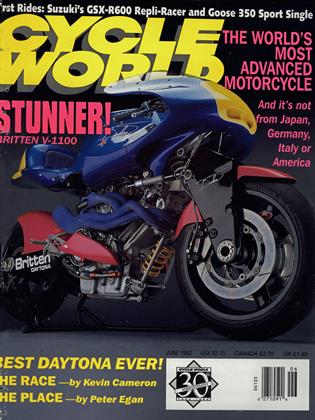Hot Honda from Hell
SERVICE
JOE MINTON
My ’79 Honda CB750 has a major problem. After 10 to 25 miles of continuous riding, it will suddenly slow way down and barely continue running. The pitch of the exhaust changes to a strange hollow sound, and faint metallic noises start coming from inside the engine. When this happens on the highway, the bike is barely able to maintain 40 mph with the throttle wide-open.
Usually, I pull over, shut the engine off and let it cool for a while; then it will start right up and run normally for a few minutes before acting up again. Sometimes, this weak running will be broken by a surge of normal acceleration for a few seconds or so, but the problem quickly returns.. Sometimes there are explosive-sounding backfires, too.
The mechanic at the local shop spent a lot of time looking for the problem, but he usually couldn’t ride the bike long enough to make it occur with any regularity. He finally gave
up because it would have been much too costly for him to continue. Obviously, I’d appreciate any help you can give me. Chris Evans Davis, California
Your problem seems to be either ignition failure or fuel starvation, and my guess is that it’s in the ignition. Sometimes, ignition components, particularly the coils, will fail or work intermittently after they have gotten warm. If one of the many thousands of turns of wire in an ignition coil breaks, for instance, the broken ends can part as the coil warms to operating temperature; upon cooling, the ends may re-contact one another and the coil will again function. Solid-state electronic components, such as the transistors that control the ignition coils, are sensitive to temperature and can exhibit failure symptoms similar to those I just described for the coils.
Your Honda 750 has two coils for its four cylinders, so the loss of one coil will terminate the spark in two cylinders, cutting power about as dramatically as you described. The metallic sound you hear is probably detonation in the two active cylinders caused by the laboring of the engine as it struggles to run while dragging two dead cylinders through their cycles.
If your dealer has an ignition-coil tester (he should), have him hook up your coils to the device and run them at maximum spark gap for at least 15 minutes—even longer, if he is willing. Don Y be surprised if he finds a coil that fails once it fully warms. A similar test can be performed on the transistors that control the ignition coils. Don Y forget that even the ignition pick-ups on the engine can fail in the same way and for the same reasons as the ignition coils.
Another effective, but difficult, diagnostic technique is to find another similar Honda that is running fine, then exchange ignition components one at a time until the problem changes bikes.
Just in case the problem is in the fuel system—although I do not believe it is-let’s discuss that possibility. The most likely cause would be the obstruction of fuel flow, which can result from a blockage in the fuel tank, in the fuel lines, or in the carburetors themselves. Since the bike never quits altogether and always seems to run on some cylinders, it is unlikely that the obstruction is in the tank or the main fuel lines, which supply all four carbs. Instead, the problem would more likely be only in the carburetors connected to the affected cylinders. And honestly, the chances of two carbs coming up with exactly the same fuel-blockage problem at exactly the same instant every time the engine falters are too remote even to consider. That s why, if it were my 750 Honda, I d spend all of my time diagnosing the ignition. □














